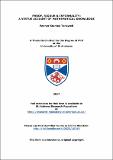Proof, rigour and informality : a virtue account of mathematical knowledge
Abstract
This thesis is about the nature of proofs in mathematics as it is practiced, contrasting the informal proofs found in practice with formal proofs in formal systems. In the first chapter I present a new argument against the Formalist-Reductionist view that informal proofs are justified as rigorous and correct by corresponding to formal counterparts. The second chapter builds on this to reject arguments from Gödel's paradox and incompleteness theorems to the claim that mathematics is inherently inconsistent, basing my objections on the complexities of the process of formalisation. Chapter 3 looks into the relationship between proofs and the development of the mathematical concepts that feature in them. I deploy Waismann's notion of open texture in the case of mathematical concepts, and discuss both Lakatos and Kneebone's dialectical philosophies of mathematics. I then argue that we can apply work from conceptual engineering to the relationship between formal and informal mathematics. The fourth chapter argues for the importance of mathematical knowledge-how and emphasises the primary role of the activity of proving in securing mathematical knowledge. In the final chapter I develop an account of mathematical knowledge based on virtue epistemology, which I argue provides a better view of proofs and mathematical rigour.
Type
Thesis, PhD Doctor of Philosophy
Collections
Items in the St Andrews Research Repository are protected by copyright, with all rights reserved, unless otherwise indicated.

